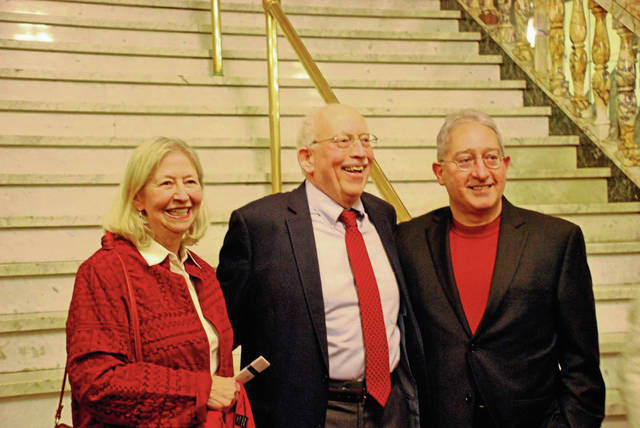https://triblive.com/local/westmoreland/greensburg-man-celebrates-life-with-first-responders-doctors-who-saved-him-following-heart-attack/
Greensburg man celebrates life with those who saved him during heart attack

“Never in a million years” would Martin “Marty” Myers have thought it could happen to him.
Even after retiring from a physically demanding job at the Supervalu warehouse in New Stanton, 70-year-old Myers, of Greensburg maintained a healthy, active lifestyle. He never smoked, rarely drank and kept his weight down.
Joan Myers even said her husband would often go to the gym, work out by himself, then come back home to work out some more.
“(He would) come home and get me and we would go to Lynch (Field) and walk two miles,” she said. “It was a huge shock. I always thought he had a strong heart.”
Myers experienced a heart attack last fall after coming home from the gym. He said the only warning signs he remembers was having heartburn for two days prior to the attack.
The couple celebrated Saturday evening surrounded by their children, grandchildren and people responsible for saving his life at Excela Health’s sixth heart awareness “Red Out” event.
It was held at The Palace Theatre in Greensburg before a Westmoreland Symphony Orchestra concert, aptly named “Heart Strings.”
Planned by Excela Health’s Community Outreach team, the party hosted cardiovascular physicians, primary care professionals and honored first-responders who assisted Marty Myers last year.
Among those recognized were Greensburg police officers Elliott Fejes and Frank Tempo and Mutual Aid EMT Shawn Penzera. Fejes was first on the scene, using CPR and an automated external defibrillator, or AED, to keep Myers alive.
It was the first time Myers and Fejes saw each other since his heart attack.
“When a call like that comes in, we all respond,” Fejes said after shaking Myers’ hand. “And it just so happens that, that day, we were the first ones there.”
Penzera and Dr. Juan Chahin, the cardiologist who cared for Myers, emphasized the importance of access to AEDs for first-responders and mentioned the Excela programs that helped Myers rehabilitate after the incident.
“Obviously, the easiest part was ours — the hospital — being ready for the patient.” Dr. Chahin said. “That night, without intervention of his wife and the paramedics and the police, this would not be able to happen.”
“It’s a wonderful experience,” Myers said in reference to the care he received. “Well, I shouldn’t say it’s a wonderful experience, because I don’t want to do it again.”
Tempo, who assisted Fejes, said their AED training just kicked in.
Excela Health spokeswoman Robin Jennings said Myers’ story highlights the importance of heart health awareness.
“(Myers’ story) just happened to really be the quintessential kind of story that says why it’s so important that you have community access to AEDs for first-responders.” Jennings said. “The real goal would be that the community continues to understand why funding for AEDs is so important.”
Penzera agreed, saying that having AEDs ready at local businesses makes them more accessible and ready-to-use, even for bystanders. Police and fire departments should especially be equipped because they are in the local communities and traveling in local areas, he said.
“It’s important to put these AEDs in the community because … the sooner you start CPR, the sooner you get an AED on, the better of a chance you have,” Penzera said.
Even though Myers and his wife both agree that not going to the doctor before the heart attack was their downfall, doctors later told them that Myers’ active lifestyle helped in his recovery.
Since the heart attack and another surgery around Christmas, the Myers are back to walking two miles a day and eating healthfully.
“You just got to take care of yourself,” Myers said, “and pray that it doesn’t happen.”
Copyright ©2026— Trib Total Media, LLC (TribLIVE.com)
